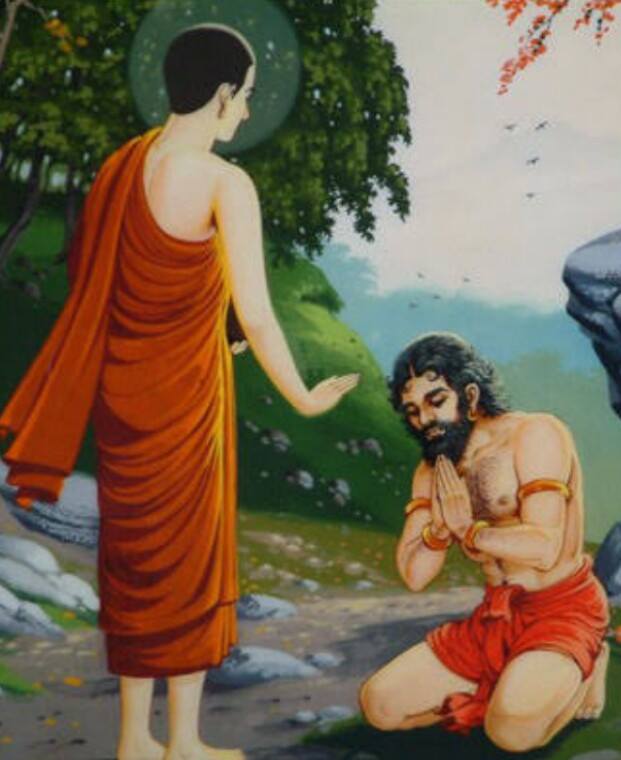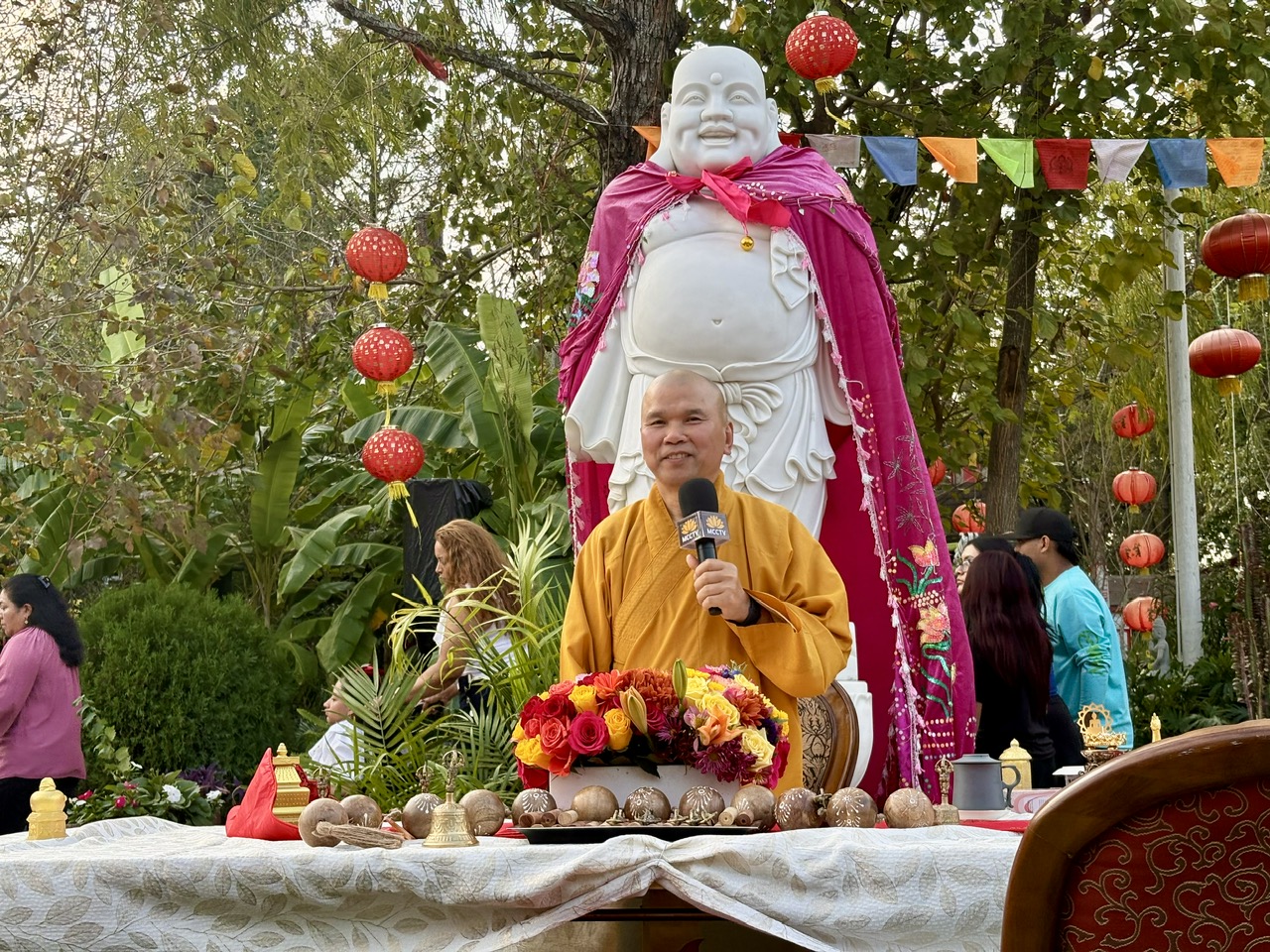Dharma Master Andrew. J. Williams

CONTEMPLATION ON KARMA
●◆● ════ ◆◇◆════ ●◆●
The Buddhist belief in the universal law of karma is a view that has been thoroughly checked and analysed by many great practitioners and realised masters since the time of the Buddha. Conviction in its validity is gained through logical reasoning. It should not simply be followed blindly. Karma means action or cause.
Any action of body, speech, or mind, places an imprint, an energy-potential or seed in the mind. Mental seeds are planted through your awareness of what you do, say or think. The imprints of these actions are left on the mind stream and carried on moment by moment, with the present moment of mind coming from the previous moment of mind.
When the necessary supporting conditions are in place, this imprint, or latent potency, manifests as perceptions or experiences of happiness or suffering. We can liken this to a biological seed, which ripens when the contributing causes and conditions of water, soil, sun, and the like are gathered together.
There are three types of action. Virtuous, non-virtuous and neutral. With virtuous actions the karma ripens as something desirable, a feeling of pleasure in the short term and, ultimately, protects you from suffering. With non-virtuous actions the karma ripens as something undesirable, a feeling of suffering and pain. With neutral actions the karma is neither virtuous nor non-virtuous and ripens as something neither desirable nor undesirable.
We should thoroughly contemplate well upon the virtuous and non-virtuous actions and their results, so that we ourselves act properly, in regards to what to do and what not to do, what to adopt and what to abandon, what to pick up and what to put down.
It is said that there are four laws of karma: 1) Karma is fixed. Virtuous or good actions must cause pleasure. Non-virtuous or harmful actions must cause suffering. 2) Karma expands. As with biological seeds, results are vastly greater than the causes. 3) Karma not committed cannot produce a result. We cannot expect the results and benefits of meditation, for example, if we don’t create the causes by practising meditation. 4) Karma when committed must produce a result. Once created, karma will not simply disappear. It remains in the mind stream, and will ripen in due time, unless purified.
The subtle working of karma and its consequences, are deeply hidden phenomena, not knowable to the ordinary mind. We need to receive teachings from unmistaken and authentic learned and highly-realised sources, to gain genuine understanding into this subject.
There are two most basic types of Karma: 1) Movement of the mind, which is mental karma, and 2) What it motivates, actions of body and speech, or movement of the mind and what it brings. Mental movement is an action of thought, what it causes are actions of body and speech. These are either communicating or not.
What causes the worlds? Our actions cause the multitude of worlds. It is the past deeds of living beings that cause all the multitude of the worlds, both the places, and the beings they contain.
Karma can ripen in this life, next life, or subsequent lives. Actions, both positive and negative, which can ripen in the same life are due to the special feature of the object, or the thought involved. Such karma which will definitely ripen are those which involve fierce mental afflictions or fait, that are directed towards an object of special qualities, anything done on a continual basis, as well as deeds with results which are something seen due to the features of the object or thought.
The four types of deeds that will definitely ripen are: 1) Deeds committed with a strong emotion, positive or negative. That is, with fierce emotions of either mental affliction or faith; 2) Deeds committed towards a very holy object, such as the Buddha or one’s teachers; 3) Deeds committed repeatedly, on a continual basis; 4) Deeds committed towards objects of special help to you, like your mother or father. This is due to the extraordinary level of assistance they have given you. They have given you a human body capable of reaching enlightenment.
The two features of a deed that can cause it to ripen in the same life are: 1) Deeds committed towards a powerful object; 2) Deeds committed with a very powerful or extraordinary motivation.
The four features that make an object special are: 1) A higher form of life, for example, deeds committed toward a human being are more powerful than towards an animal, as the former has a greater chance of attaining enlightenment in this life; 2) Beings in a state of serious suffering; 3) Someone who has given you very special assistance; 4) Someone who possesses high spiritual qualities or realisations, as they have reached various unstained states, totally involved with helping all living beings. Whether helping or harming such objects with these very special features will surely lead to a quick experience of an appropriate result.
The four types of consequences from a karmic action are: 1) A ‘Ripened’ result: Refers to the type of rebirth a being will take. For example, for killing, depending on the intensity of the mental poisons, rebirth will occur in one of the states of suffering, in the hell realm, the hungry ghost realm, or the animal realm; 2) A ‘Corresponding Experience’ result: Even if born human, you tend to get hurt in the same way you hurt others. For example, for killing, life is short and you get sick easily; 3) A ‘Corresponding Habit’ result: You tend to enjoy the same sort of deeds in the next life, such as having an attraction to killing even as a child; 4) ‘Environmental’ result: Your deeds also affect the kind of world you later live in. For instance, consequences expressed in the outer world for killing are that food, crops and medicines, are inferior, with little nutrition or potency, and cause disease, as well as many beings around you dying early.
The six conditions for deeds to be ‘Done and Collected’ are: 1) The deed must be done intentionally. That is, the action is premeditated. It is not done on the spur of the moment, or accidentally; 2) The deed must be done to its completion. It must be planned, carried out, and completed; 3) The person who committed the deed feels no regret later; 4) There must be no counteraction to work against the force of the deed. That is, without the purification of confession, regret, future restraint, and other antidotes; 5) The deed must be done with the necessary attendants. These are: Any deed in which you rejoice having committed, done with the preliminary motivation, and taken to its final conclusion; 6) The deed is of a type certain to ripen. That is, done with strong emotion, done repeatedly, and done toward a holy object, parents or teachers.
We must purify past negative deeds, and restrain ourselves from collecting new bad deeds. We must protect and strengthen the positive deeds we have collected already, not allowing them to degenerate, as well as gathering new positive imprints.
●◆● ════ ◆◇◆════ ●◆●
~Dharma Master Andrew. J. Williams~





















